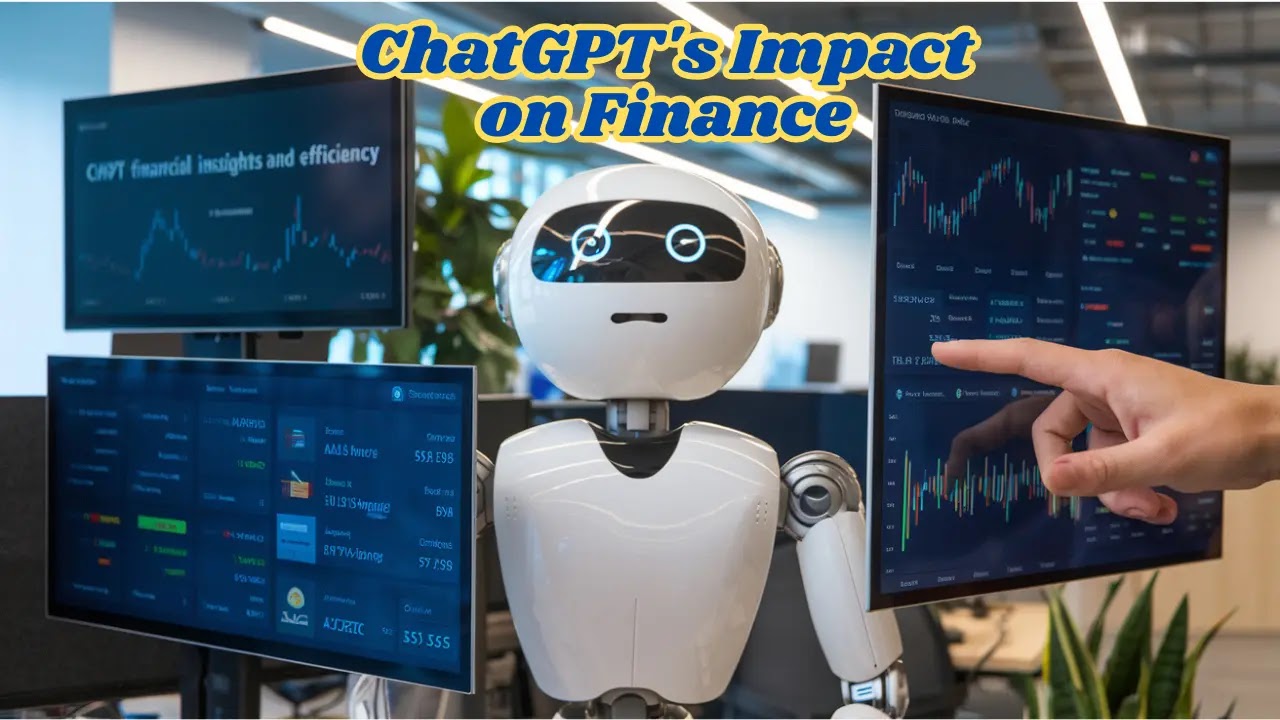Artificial Intelligence (AI) has revolutionized various industries and finance is no exception. One of the leading advancements in this space is using ChatGPT AI to transform financial insights and efficiency.
As organizations strive to keep up with ever-evolving market conditions, ChatGPT offers a solution that enhances decision-making, cuts operational costs, and drives personalized customer experiences.
In this comprehensive guide, we will explore how ChatGPT AI transforms financial insights, efficiency, and the overall financial landscape.
Understanding ChatGPT’s Impact on Finance
ChatGPT, powered by OpenAI, represents a major technological leap in how financial institutions can interact with customers, process data, and enhance internal operations.
By harnessing the power of natural language processing (NLP), ChatGPT AI can analyze, interpret, and generate insights from vast volumes of financial data.
This ability helps financial professionals derive meaningful insights that are critical for shaping organizational strategy.
ChatGPT AI transforms financial insights by enabling institutions to:
- Automate customer service with intelligent chatbots.
- Generate precise and timely reports on market performance.
- Streamline risk assessment through predictive analytics.
- Empower personalized wealth management.
Learn more about how ChatGPT is used in businesses.
Enhanced Financial Insights Using ChatGPT AI
Leveraging Data for Actionable Insights
One of the biggest challenges faced by financial institutions is the ability to derive actionable insights from large data sets.
ChatGPT AI transforms financial insights by leveraging big data and identifying trends in real-time. It can identify potential opportunities and risks, providing financial experts with data-backed recommendations.
Moreover, AI’s capability to synthesize and present data in a clear, human-readable manner reduces the burden on financial analysts and helps them focus on strategic decision-making.
For a deeper dive into AI’s role in finance, visit Artificial Intelligence in Finance.
Personalized Financial Advice
AI advancements like ChatGPT have also ushered in a new era of personalized financial advice. Instead of generic solutions, customers can now receive customized insights that are based on their financial behavior, market conditions, and individual needs. This not only enhances user experience but also improves the likelihood of customer retention.
For example, financial institutions can use ChatGPT to create AI-powered financial advisors that provide 24/7 support, answering queries on savings, investments, retirement plans, and loans.
This has transformed the industry, bringing the benefits of automation and personalization to a wider audience.
Discover the power of voice with ChatGPT’s voice assistant capabilities.
ChatGPT AI in Financial Risk Management
Improving Risk Assessment and Mitigation
In the financial sector, managing risks efficiently is key to sustained growth and customer trust. ChatGPT AI transforms financial insights by enabling more nuanced risk assessment models.
Through predictive analytics, ChatGPT can help financial professionals assess creditworthiness, detect potential fraud, and foresee possible economic downturns.
Machine learning algorithms embedded within the ChatGPT framework analyze historical data, identify anomalies, and provide suggestions that can help mitigate risks in advance.
By generating early warnings and improving credit scoring models, ChatGPT AI effectively reduces the probability of financial losses.
Check out the latest information on AI applications in financial services.
Fraud Detection and Prevention
Fraudulent activity is a persistent threat in the finance industry, and ChatGPT AI provides a robust solution for fraud detection. It is capable of detecting unusual activities in transactions by analyzing transaction patterns and user behaviors and flagging anomalies in real-time.
Furthermore, ChatGPT AI is instrumental in enhancing security protocols through better compliance checks and monitoring systems.
Financial firms can significantly reduce the occurrence of fraud by implementing real-time automated monitoring powered by AI.
Efficiency Gains with ChatGPT AI
Automating Routine Tasks
ChatGPT AI transforms financial insights and workflows through its ability to automate routine and repetitive tasks. Financial institutions can deploy ChatGPT-powered bots to handle mundane yet important responsibilities, such as:
- Answering frequently asked customer queries.
- Assisting clients with loan applications.
- Generating and updating financial statements.
By automating these routine processes, financial institutions can drastically reduce operational costs and eliminate human errors that may arise from repetitive work. Employees, in turn, can dedicate more time to complex and value-added activities.
For insights into automation’s impact on different sectors, read AI and machine learning’s role in automation.
Streamlined Regulatory Compliance
Financial institutions must adhere to a variety of regulations that are continually updated. Non-compliance can lead to severe financial penalties and reputational damage.
ChatGPT AI transforms financial insights by offering support for compliance monitoring. It ensures that financial operations are in line with current regulations by keeping a constant eye on compliance requirements.
Furthermore, ChatGPT’s AI capabilities allow for efficient analysis of regulatory documents, highlighting critical areas for further review, and ensuring all aspects are addressed on time.
This effectively reduces compliance risks and helps financial institutions stay updated with changing laws.
To learn more about managing risks and finances, see Risk management in commercial real estate.
How ChatGPT AI Transforms Financial Insights in Wealth Management
Personalized Wealth Management
The wealth management sector has witnessed remarkable transformation thanks to ChatGPT AI. AI algorithms now provide personalized wealth management services that once required human advisors.
By analyzing spending habits, risk appetite, and financial goals, ChatGPT AI can provide curated financial advice tailored to each client.
Clients benefit from timely alerts about market shifts and personalized recommendations about portfolio diversification. This level of personalization helps investors optimize their portfolios, maximizing gains while keeping their risk within acceptable levels.
AI-Powered Investment Forecasting
ChatGPT AI transforms financial insights by providing powerful investment forecasting abilities. AI models learn from historical data, economic patterns, and macroeconomic factors to generate predictions about market trends.
This allows financial advisors and investors to make more informed decisions and adapt their investment strategies proactively.
Long-tail keyword: “How ChatGPT AI investment forecasting helps reduce financial risks”.
Check out the recent developments in income sources using AI.
The Pros and Cons of ChatGPT for Finance
ChatGPT, an AI language model developed by OpenAI, has been making waves across multiple industries, and finance is no exception.
Its ability to understand and generate human-like text can make it an appealing tool for financial professionals looking to streamline processes, gain insights, and enhance decision-making.
However, as with any technology, ChatGPT has its strengths and limitations when applied to finance. Let’s explore these pros and cons in more detail.
Pros of Using ChatGPT in Finance
Rapid, Customizable Responses
Its flexibility saves time by generating responses that can easily be customized to your requirements, allowing finance professionals to focus on analysis rather than administrative tasks.
Generation of Computer Code
The AI can produce snippets of Python or VBA, for example, which can expedite processes like data cleaning, financial analysis, or reporting.
Task Automation and Versatility
It can perform everything from running simple calculations to suggesting financial analysis strategies, reducing the workload of finance teams and allowing them to work more efficiently.
Expense Management and Decision-Making
By summarizing key financial information, it enables managers to make informed decisions with less manual data gathering and analysis.
Accessible Programming Power
This democratizes the ability to automate workflows and analyze data without relying on experienced developers.
Cons of Using ChatGPT in Finance
Limited Training Data
Financial professionals must provide additional context and inputs if they need up-to-date information.
Data Privacy and Security Concerns
For this reason, it’s critical to use ChatGPT in ways that don’t compromise sensitive information or to use enterprise solutions that provide security features.
Risk of Errors or Inaccurate Information
In a field like finance, where accuracy is paramount, such errors can lead to incorrect financial analysis or costly mistakes. Therefore, every output from ChatGPT must be fact-checked and reviewed by a financial expert.
Trial and Error with Prompt Engineering
This process can involve several iterations and refinements to get the desired outcome, which may not always be efficient.
Dependence on Up-to-Date Input
This extra step can limit the AI’s utility when used for real-time decision-making without human intervention.
Best Practices for Using ChatGPT in Finance
To get the best results when using ChatGPT for finance, several best practices should be followed:
- Avoid Inputting Confidential Data: Never input sensitive or confidential financial information into ChatGPT to protect your company’s data privacy. Instead, use versions of the technology embedded in software that provides enterprise-level security.
- Fact-Check All Outputs: Always verify the accuracy of ChatGPT’s output, particularly when dealing with financial data or reports. Edit and refine the content to ensure compliance with industry standards and regulations.
- Use Specialized Software with ChatGPT Integration: To enhance security and performance, use software tools that integrate ChatGPT via APIs and provide the necessary safety mechanisms, like enterprise-grade encryption.
- Leverage ChatGPT for Initial Drafts, Not Final Outputs: ChatGPT can be incredibly efficient for creating first drafts or generating ideas, but human oversight is necessary to refine and validate the final output, particularly for financial statements and compliance-related documents.
The Future of ChatGPT and Finance
The role of ChatGPT in finance will likely continue to evolve. Increasingly, financial software products will embed ChatGPT using API connections rather than relying solely on direct user prompts.
This integration will allow ChatGPT to work seamlessly with other artificial intelligence and machine learning models, as well as robotic process automation (RPA) tools, to deliver a holistic finance automation experience.
One example is Tipalti, which has already started embedding ChatGPT in its finance automation solutions.
Tipalti offers comprehensive automation software for PO management in procurement, helping organizations future-proof their business through AI-driven digital transformation.
Such tools can enhance productivity, streamline operations, and make finance teams more strategic contributors to the business.
Leveraging ChatGPT in Finance: Enhancing Accuracy with Domain-Specific Tools
ChatGPT, as a natural language processing model, is powerful but has its limitations when used on its own for finance.
Its potential is best realized when combined with domain-specific automation tools and AI models, ensuring that finance professionals have access to the most accurate, efficient, and secure tools available.
To learn more about how AI-driven solutions can transform your finance department, download our eBook: “The Human Impact of Digital Transformation in Your Finance Department.”
Conclusion:
ChatGPT AI transforms financial insights and efficiency in the rapidly evolving financial landscape, setting a new standard for how institutions manage data, risks, compliance, and customer relationships.
The benefits, ranging from enhanced customer engagement to improved decision-making and reduced operational costs, have made ChatGPT a powerful ally in finance.
For organizations looking to embrace the future, leveraging ChatGPT AI’s capabilities can provide a significant competitive edge, ultimately leading to better customer experiences and long-term success.
As technology advances, we can only expect the role of AI in finance to grow more influential, transforming the industry as we know it.
Don’t forget to read about why investing in ChatGPT is beneficial.
FAQ: ChatGPT AI and Financial Transformation
1. How does ChatGPT AI enhance customer service in the finance industry?
ChatGPT AI offers advanced chatbots that operate 24/7, providing instant answers to customer inquiries, thus improving customer satisfaction and response times.
These chatbots can handle tasks like basic account inquiries, explaining financial products, and even suggesting personalized services.
2. Can ChatGPT help in reducing financial fraud?
Yes, ChatGPT AI is instrumental in reducing fraud by detecting irregular transaction patterns and flagging them for further investigation. Its ability to constantly monitor activities in real-time makes it highly effective for fraud prevention.
3. How do financial advisors benefit from using ChatGPT AI?
ChatGPT AI reduces manual tasks, allowing financial advisors to focus on more complex aspects of client relations and wealth management. Additionally, it provides curated investment insights that advisors can use to make better decisions.



